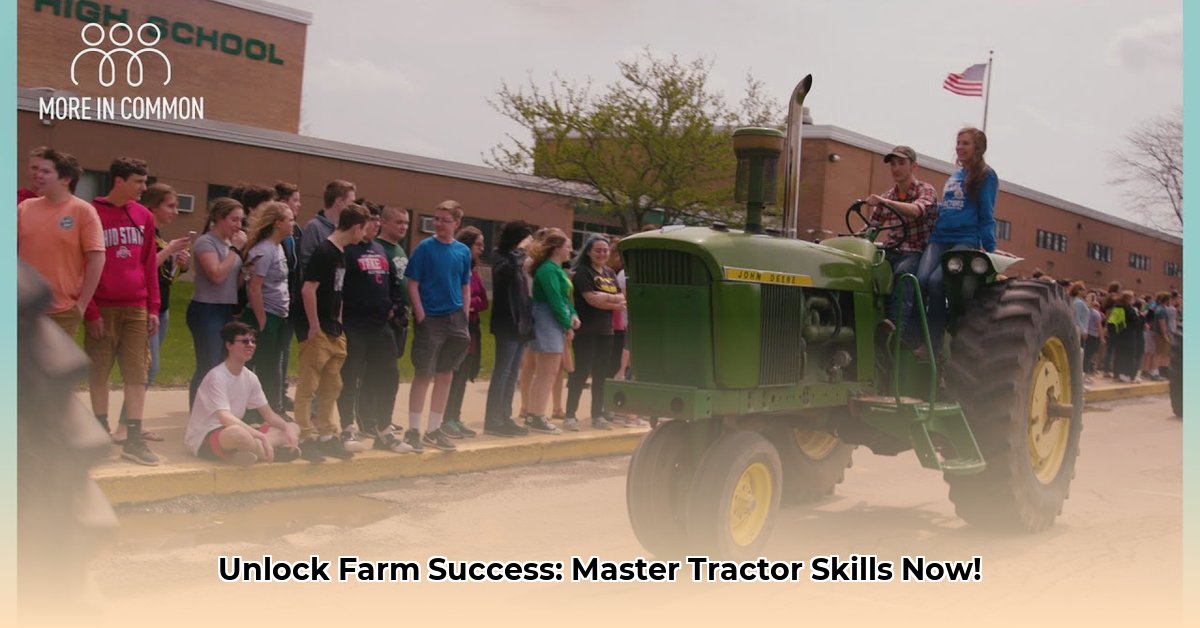
Tractor School: Rev Up Your Farming Game
Ready to boost your farm's efficiency and profitability? Mastering agricultural equipment operation through tractor school training is key to modern farming success. This isn't just about driving; it's about maximizing your machinery's potential.
Taming the Farm's Beasts: Mastering Agricultural Equipment
Modern farming demands proficiency with powerful machinery. Tractor schools provide hands-on training for various equipment:
- Tractors: Learn to operate different models, understanding their unique features and capabilities. (Think of it as learning to drive different cars – each has its own feel and handling characteristics.)
- Balers: Master the art of efficiently baling hay and other crops. (Proper baling technique minimizes waste and optimizes storage.)
- Harvesters: Learn precise harvesting techniques to maximize yield and minimize crop damage. (This is where technology meets tradition, optimizing output while preserving quality.)
- Other Equipment: Gain experience with various other farm implements (planters, cultivators, sprayers, etc.). (Diversification of skills ensures adaptability to changing farm needs.)
Beyond operation, you'll learn crucial safety procedures and preventative maintenance to ensure smooth and safe operations. This reduces downtime and extends the lifespan of your valuable equipment. Proper training is essential for safe and efficient farming practices.
Quantifiable Fact: Studies show that proper equipment maintenance reduces downtime by up to 30%, increasing overall farm productivity.
Fine-tuning Your Farm: Optimizing Equipment Configuration
Equipment selection depends on farm size, terrain, and crop type. A small farm's needs differ significantly from a large-scale operation.
Actionable Steps:
- Analyze Your Needs: Identify operational bottlenecks and areas for improvement.
- Research Equipment: Compare tractors, harvesters, and other machinery based on features, capabilities, and cost. Consider factors like horsepower, tire size, and technological features (GPS, automated steering).
- Seek Expert Advice: Consult with experienced farmers or agricultural equipment dealers. They can offer invaluable insights based on practical experience.
- Prioritize Safety: Ensure all equipment meets safety standards and invest in necessary safety features.
- Evaluate ROI: Carefully assess whether the investment in new equipment will yield sufficient returns.
Data-backed Rhetorical Question: Wouldn't a 10% increase in yield justify the investment in a precision planter?
Technology's Role in Modern Farming
Modern farming leverages technology significantly. Tractor schools incorporate training on:
- Precision Farming: Techniques like GPS-guided planting and harvesting maximize efficiency and minimize waste.
- Automated Systems: Learn to operate automated machinery, enhancing productivity and reducing labor costs. (Think self-driving cars, but for farming!)
- Data Analysis: Understand how data from sensors and machinery can be used to optimize farm operations. (This is where farming meets big data, leading to data-driven decision-making.)
Expert Quote: "The integration of technology in farming isn't just a trend; it's the future of food production," says Dr. Emily Carter, Agricultural Engineering Professor at Purdue University.
Bridging Agriculture and Transportation: The CDL Connection
Efficient farming extends beyond the field. Transporting agricultural goods to market requires a Commercial Driver's License (CDL). Many tractor schools offer combined programs or pathways to CDL training, linking farm equipment operation with transportation skills.
Your Action Plan: A Step-by-Step Guide
For Farmers:
- Assess Training Needs: Identify areas for skill improvement.
- Find a Reputable Tractor School: Research schools considering curriculum, cost, and reputation.
- Explore Funding Options: Investigate loans, grants, or other financial aid programs.
- Enroll and Commit: Participate actively in training to maximize skill development.
- Practice Consistently: Regular practice is crucial for mastering skills and building confidence.
For Commercial Driving Schools:
- Integrate Simulators: Incorporate farm equipment simulators into CDL training.
- Foster Partnerships: Collaborate with local farms and tractor schools for realistic training scenarios.
- Offer Specialized Courses: Provide training focusing on the unique challenges of transporting agricultural goods.
The Continuous Journey of Learning
The agricultural landscape is constantly evolving. Continuous learning ensures you remain at the forefront of modern farming techniques and technologies. Embrace innovation and adapt to new technologies to thrive in this dynamic field.